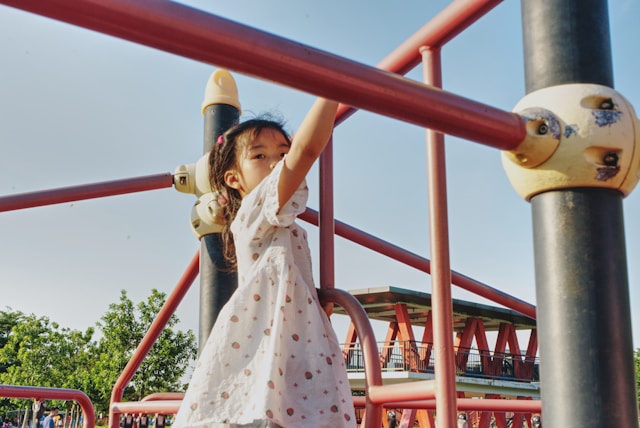Playgrounds are vibrant spaces where children can unleash their energy, explore, and have fun. However, amidst the excitement, it’s crucial to ensure that kids understand the importance of playground safety. By educating them about potential hazards and proper behavior, parents and caretakers can create a safer environment for play. In this blog post, we’ll delve into various aspects of playground safety education, from identifying common hazards to promoting sun safety and handwashing practices.

Identify Common Playground Hazards
Before diving into playground play, it’s essential to familiarize children with common hazards they may encounter. From uneven surfaces to broken equipment and sharp edges, there are several potential dangers lurking in playgrounds. Encourage kids to be vigilant and watch out for these hazards. Teach them to avoid areas with broken equipment, exposed bolts, or slippery surfaces. Helping children understand and recognize common playground hazards can encourage them to steer clear of potential dangers and minimize the risk of accidents and injuries.
Explain Playground Rules
Every playground has its set of rules designed to ensure the safety and well-being of all children. Take the time to explain these rules to kids before they start playing. Emphasize the importance of following instructions, taking turns, and respecting others. Reinforce key rules such as no pushing, no roughhousing, and using equipment properly. Instilling a sense of responsibility and respect for the rules can allow children to have safer and more enjoyable play experiences.
Show Proper Use of Playground Equipment
Showing children the proper use of playground equipment is crucial for ensuring their safety while they play. Proper use not only reduces the risk of accidents and injuries but also enhances the overall playground experience. By demonstrating how to use swings, slides, climbing structures, and other equipment safely, children learn valuable skills that help them navigate playgrounds with confidence. They understand the importance of gripping handles securely, climbing stairs carefully, and sitting properly on swings. Moreover, teaching proper use encourages children to respect playground rules and considerate behavior towards others. Ultimately, instilling these habits early on fosters a culture of safety, creating a safer and more enjoyable environment for all children to play and explore.
Explain Safe Landing Techniques
Falls are an inevitable part of playground play, but knowing how to land safely can minimize the risk of injury. Experienced injury attorneys in Atlanta have seen children face a higher risk of injury due to falls. Teaching children safe landing techniques, such as bending their knees and landing on their feet or bottom is an important way to mitigate the severity of injuries on the playground. Encourage children to avoid landing on their head, hands, or wrists, as these areas are more prone to injury. By practicing safe landing techniques, children can reduce the impact of falls and protect themselves from harm.
Encourage Supervision During Play
Adult supervision is essential for ensuring children’s safety on the playground. Encourage parents, caregivers, and teachers to supervise children actively while they play. Remind adults to stay close, keep an eye on the children, and intervene if necessary. Supervision is especially crucial for younger children or those who may be more prone to accidents. Encouraging children to wait for adult supervision before playing on a playground can help children feel they can play safely and prevent the risk of serious accidents. Adult supervision is significantly beneficial while children are at play and can help by quickly address any safety concerns and ensuring a safer play environment.
Practice Sun Safety
Outdoor play often exposes children to the sun’s harmful UV rays, increasing the risk of sunburn and skin damage. Promote sun safety practices by encouraging children to wear sunscreen, hats, and sunglasses when playing outdoors. Especially during the summer, teaching children to seek shade during peak sun hours and stay hydrated by drinking plenty of water can be significantly beneficial in preventing sun-related illnesses.
Promote Handwashing
Handwashing is a simple yet effective way to prevent the spread of germs and illnesses, especially in communal spaces like playgrounds. Encourage children to wash their hands before and after playing to remove dirt, bacteria, and germs. Provide hand sanitizer stations near playgrounds for added convenience. By promoting handwashing habits, we can help children stay healthy and reduce the risk of infections.
Educating kids about playground safety is paramount for creating a safe and enjoyable play environment. By identifying common hazards, explaining playground rules, demonstrating proper equipment use, and encouraging safe behaviors, we can empower children to play safely and confidently. Additionally, promoting sun safety and handwashing practices further enhances children’s well-being and reduces the risk of accidents and illnesses.
















Add Your Comment